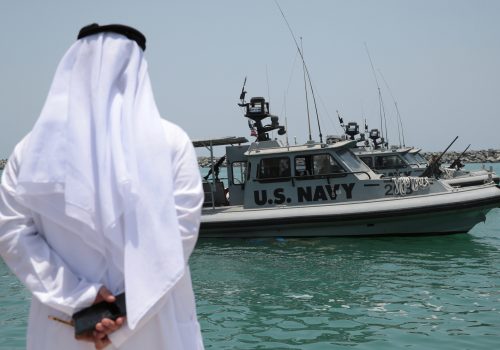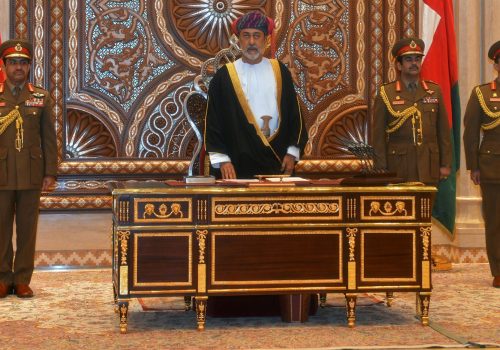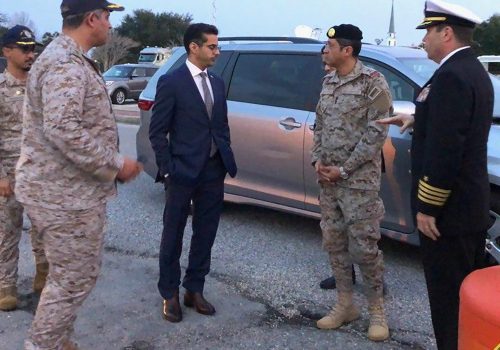A few memories of Kuwaiti Sheikh Sabah
One of the memories that I recall most clearly from my time as US ambassador in Kuwait was wondering why Secretary of Defense Donald Rumsfeld was having such a scratchy dialogue with the emir. We had urged the defense secretary to come to Kuwait, mainly in order to acknowledge the contributions that Kuwait had made to the US campaign in Iraq. The two were meeting at the airport in Kuwait (a rude request by Rumsfeld’s staff that the Kuwaitis acquiesced to) in a large room with officials fanned out on either side of them in a big “U” shape.
The acoustics were bad, so it was hard to hear, but Rumsfeld was pressing the emir to continue to provide free fuel to US forces in Kuwait for use on missions to Iraq and Afghanistan. By then, the Kuwaitis were tiring of this open fuel spigot that had gone on for much longer than anyone had expected. Sheikh Sabah al-Ahmad al-Sabah was telling Rumsfeld some minimal price needed to be paid, in order to respond to rumblings in the Kuwaiti parliament. But Rumsfeld’s mind was elsewhere.
Earlier that morning of December 8, 2004, he had visited troops at a large US Army base in Kuwait and a soldier had the temerity to ask why they were stuck with unarmored vehicles. Rumsfeld’s fatuous “you go to war with the Army you have” response had already made its way to the US morning news cycle and that was what was on his mind, not thanking the emir or the Kuwaitis, or even being civil.
This sort of imbalance in the US-Kuwait relationship was what Sheikh Sabah had to navigate and he did credibly well. This was especially true in his dealings with President George W. Bush. I was present with the two leaders together during two different visits to the White House by the emir. In preparing for the first visit, I thought of all the things that could go wrong and tried to prepare the National Security Council staff for any eventuality. But I had this very wrong. On both visits, the Emir and the president mainly exchanged stories and made jokes. These were not to be policy discussions. The atmosphere was family-like, with the two leaders doing 95 percent of the talking during their meeting and luncheon that followed, despite the presence of all the US and Kuwait senior leadership. It was indeed a family affair. The emir did not need to mention the role of President George H.W. Bush in restoring Kuwait to the Kuwaitis in 1991. It was in the DNA of the relationship, both for good and ill.
The good, such as it was and is, included US access to major bases in the Gulf that it used to project power in Iraq, Afghanistan, and elsewhere in the region. (Recall that Kuwait was the main entry point for US troops headed to Iraq, after Turkey said no.) The Kuwaitis basically paid the freight for these bases and their support. The ill was that a generation of US policymakers and pundits thought that this was only right, making the argument that “we saved your country, therefore you owe us.” That argument was wearing thin by the time Sheikh Sabah artfully nudged aside the ailing Sheikh Saad in 2006, who was the legal heir to deceased Sheikh Jaber. The new emir was to lead a Kuwait where the older generation was indeed very grateful to the United States, but the 1990 invasion was a distant memory or no memory at all for young Kuwaitis. Many young people were hostile to the US project in Iraq and not at all displeased to see successful insurgent attacks on US forces there.
Another credit to Sheikh Sabah and to the relationship he had with the second President Bush was granting of the vote to Kuwaiti women in 2005. We pushed hard for this at the Embassy. It was a big part of the “freedom agenda” for Kuwait invented by the Dick Cheney neo-cons in Washington, and one of the only useful projects to result from their efforts. The Embassy quietly supported women activists as they pursued the ballot. That was necessary but not sufficient. Again it was about the Sabah/Bush “family.” Women got the vote in Kuwait because the emir was tired of hearing from President Bush about the issue and so decided to make sure the measure had enough votes to pass in Parliament when in came up in May 2005. It passed and it made a difference.
Although much is rightly made of Sheikh Sabah’s role as “dean of Arab diplomats” and respected mediator, it seemed to me that he was fatigued by his role as emir about the same time he achieved it. After decades as foreign minister, he knew all the players in the region but did not seem capable of influencing them to any large degree as emir. His recent efforts to mediate between Saudi Arabia and Qatar were largely fruitless, and there is little evidence that the confident young Saudi Crown Prince Mohammed bin Salman considered Sheikh Sabah’s advice of much value. Other Gulf leaders thought the emir should “do something about” his pesky elected Parliament, especially as they feared contagion into their own not-so-democratic systems. And indeed at home, the emir spent a lot of effort making sure that the spoils of oil wealth were divided in a way that would keep members of the large al-Sabah clan happy and quiet, as well as keep Islamists and other opposition groups from getting too rambunctious.
Many will speculate about where Kuwait goes from here and whether there will be a leadership crisis. Given the opaque nature of al-Sabah family affairs and the complexity of bargains they will make among themselves and with others, I will demur from opining. I doubt US dependence on Kuwaiti bases will change by actions on either side. Maintaining the status quo is just too easy. What we do need to pay more attention to are the voices of young people in Kuwait. They are not cohesive—some want greater liberalization and are tired of being told what to do by old people. Some just want a secure government job. Some are active Islamists who want to change the nature of the regime. Some want to be entrepreneurs but find the system rigged against them. More than anything else, the new Kuwaiti leader will need to find new and better ways of responding to this generation of youth.
Richard LeBaron is a non-resident senior fellow for the Rafik Hariri Center at the Atlantic Council. LeBaron spent 33 years in the US diplomatic service where he held various senior positions in US embassies in the Middle East, including ambassador to Kuwait. Follow him on Twitter: @RBLeBaron.
Sign up for all the latest updates!
Sign up for the MENASource newsletter, highlighting pieces that follow democratic transitions and economic changes throughout the region.
Image: U.S. President George W. Bush (R) meets the Emir of Kuwait Sheikh Sabah al-Ahmad al-Sabah in the Oval Office at the White House in Washington September 5, 2006. REUTERS/Jim Young


